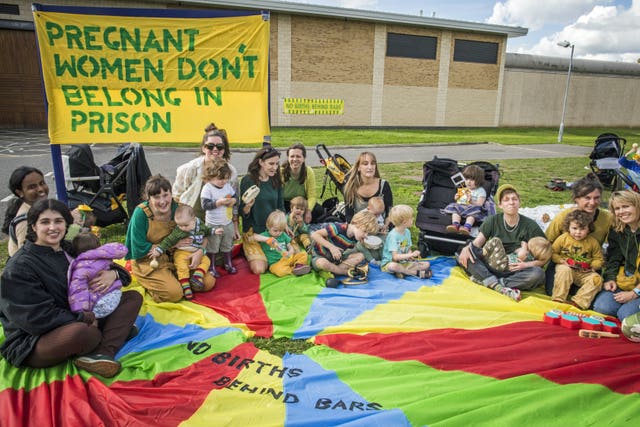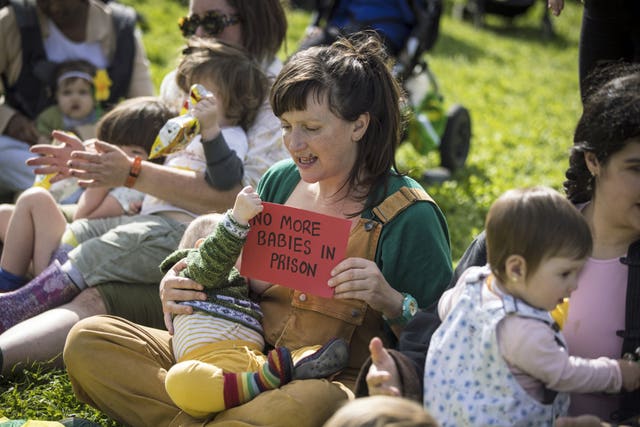Protesters gather at HMP Bronzefield to call for end to pregnant women in prison
It comes as the latest in a sequence of public protests over mothers in prison, organised by campaign groups No Births Behind Bars and Level Up.

Protesters have gathered outside HMP Bronzefield in Surrey to call for an end to the imprisonment of pregnant women and new mothers.
Activists, former inmates and mothers with their children held a demonstration outside the prison on Saturday afternoon – the third anniversary of a new born baby’s death at HMP Bronzefield in 2019.
It comes as the latest in a sequence of public protests over mothers in prison, organised by campaign groups No Births Behind Bars and Level Up.
The demonstration on Saturday was set up like a child’s birthday party – with picnic rugs, a musician playing the guitar, children dancing and people singing nursery rhymes.

Janey Starling, co-director of Level Up, said the demonstration was “joyful” and “everything women in prison should be experiencing”.
Ms Starling said that despite the death of two babies in prison in the last three years, “very little has changed”.
“We are here today to demand the end of imprisonment of pregnant women,” she said.
“What we are calling for are alternatives in the community that support women.”
Anna Harley, 36, who gave birth while she was remanded in custody ahead of her sentencing, joined the protest.
Ms Harley said she was granted bail for three months after the birth of her son.

The 36-year-old said the experience is “still affecting me”, adding: “I have been home five years but still to this day, it was the worst time of my life.”
On securing a place in the mother and baby unit, she said: “It was a very stressful time but it should be one of the most special times in a person’s life and for me personally, I felt it took that all away from me.”
Ms Harley also described going into labour at 5.30am, but the prison did not get her into an ambulance for another five hours.
She also said she was handcuffed to an officer and gave birth next to two prison officers.
But she said she was “incredibly lucky” to have reached hospital in time.
On the mothers who did give birth in prison, she said: “My heart breaks for them. It is just so easy to see how it happened and that is why it needs to stop because it will happen again.”
Ms Harley said: “I carry a guilt with me and I think I will carry it with me for the rest of my life.
“A trauma will live with me for ever for having gone through that and having my child in these circumstances.”
Mel Evans, 39, from Manchester, who set up the campaign group No Births Behind Bars along with her friend Emma Hughes, also joined the protest on Saturday.
She said both she and Emma were told they faced jail time after being charged over a protest a few years ago. Emma was pregnant at the time.
The pair were ultimately sentenced to a community order but the experience prompted them to set up the campaign group, she said.
On the recent deaths of babies in prison, Ms Evans said: “I just think that is unconscionable.
“I cannot bear to live in a society where that is allowed to happen.”
“It is just barbaric,” she added, saying that conditions pregnant women face in jail are “horrific”.
“No pregnant woman should be held in prison, no baby should be born in prison and new mothers should be able to share the start of their baby’s life in the community.”
A Ministry of Justice spokesperson said: “Custody is already a last resort for most women and we have made significant improvements for pregnant women in prison. We now have specialist mother and baby liaison officers in every women’s prison, have put in place additional welfare observations and carry out better screening and social services support so that pregnant prisoners get the care they require.
“The number of women entering prison has fallen by 24 per cent since 2010 and we are investing millions into community services like women’s centres and drug rehabilitation so even fewer women end up there.”





